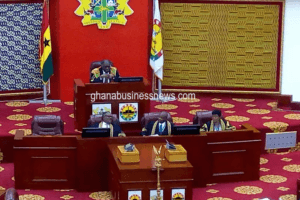Parliament salutes Ghanaian scientists on appointment to Climate Change Panel
 Parliament has congratulated three eminent Ghanaian scientists for their appointment to the working group III of the International Panel on Climate Change (IPCC) from 2018 to 2021.
Parliament has congratulated three eminent Ghanaian scientists for their appointment to the working group III of the International Panel on Climate Change (IPCC) from 2018 to 2021.
The three, Dr Adolf Acquaye, Dr Joseph Ekow Essandoh-Yeddu and Dr Lawrence Agbemabiese were among 229 scientists, academics and professionals selected globally for the IPCC’s working group III.
Mr Frank Annoh-Dompreh, the Chairman of the Foreign Affairs Committee, in a statement on the floor of Parliament, commended the three scientists for their achievements, saying their great feet are worth celebrating.
The establishment of the IPCC was endorsed by UN General Assembly in 1988.
Its initial task, as outlined lined in UN General Assembly Resolution 43/53 of December 6, 1988, was to prepare a comprehensive review and recommendation with respect to the state of knowledge of the science of Climate Change, its social and economic impact, and potential response strategies and elements for inclusion in a possible future international convention.
Since 1988, the IPCC has had five assessment cycles and delivered five Assessment Reports, the most comprehensive scientific reports about climate change produced worldwide.
The IPCC has also produced a range of Methodology Reports, Special Reports and Technical Reports, in response to requests for information on specific scientific and technical matters from the United Nations Framework Convention on Climate Change (UNFCCC), governments and international organizations.
Mr Annoh-Dompreh recognised the hard work of the three Ghanaian experts who have distinguish themselves in the study of Climate Change and related issues as well as researching into finding possible solution to its effects on livelihoods.
He stated that Dr Acquaye and Dr Agbemabiese were expected to work as Lead Authors for the “Industrial Chapter” and Innovation, Technology Development and Transfer Chapter whiles Dr Essandoh-Yeddu would work as a review editor for the energy systems chapter.
He explained that the term Climate Change was often used to refer to specifically to anthropogenic climate change caused by human activity as opposed to changes in climate that may have resulted as part of the earth’s natural processes.
He said Climate Change was a global issue and needed concerted efforts by all nations to tackle it.
Mr Annoh-Dompreh said uncontrolled industrialisation processes had brought about the release of nitric oxide and other greenhouse gases such as methane gas and carbon dioxide into the atmosphere.
He said when those gases got into the atmosphere, they became detrimental to the earth’s ozone layer, which protected the biosphere from the direct impact of solar radiation.
He said even though the Government was making commitments to putting the nation’s oil and gas and other resources into prudent use while sustaining the economic growth and development of the nation and her people, the challenging relationship between the environment and development nexus was the growing threats of global warming of which Ghana was no exception.
“Climate Change in Ghana has become a serious threat to livelihood” he added.
Mr Annoh-Dompreh cited the drought and annual floods in many parts of the Northern Region as examples which were of concern to the nation, adding that people living along the banks of the White Volta were constantly displaced.
He said in the southern part of the country, indiscriminate human activities had also contributed to the climatic condition, leading to a rise in the sea level, which polluted other water bodies destroying aquatic life.
He said this had reduced the economic activity of most inhabitants within those areas who primarily fished for a living.
A prolong period of not being able to find alternatives to raising their living standards would adversely affect their education, health and social-being, he said.
Mr Annoh-Dompreh, therefore, called on government to be conscious of the phenomenon and find ways of mitigating its effects adding that Climate Change was no longer some far-off problem but had come to stay.
He urged the Ministry of Communication, through its agencies, to make it a priority to give the right communication and demystify climate change to the farmers.
Source: GNA
